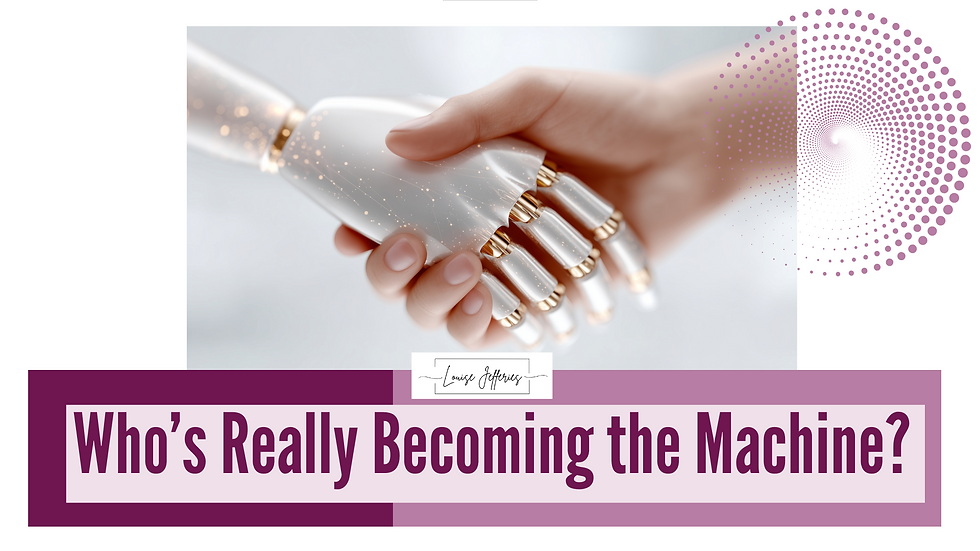Authentic interviewing for introverts
- jefferiesart
- Aug 10, 2025
- 4 min read

Interviews aren't everyone's favourite activity; especially for introverts in Pharma and Biotech having to interview in English as a non-native speaker.
Many of my connections who have recently been made redundant are navigating job searches for the first time in 10-20+ years. For them, the challenges are fourfold:
Having to self-promote when discussing achievements feels uncomfortable
Trying to summarise decades of experience into one high pressure conversation
Answering behavioural questions when you don’t enjoy speaking about yourself
Doing all this in English as a non-native speaker
For introverts, behavioural questions in particular represent a particular kind of challenge. These questions require not just recalling experiences, but sharing personal stories which can feel deeply uncomfortable when self-promotion doesn't come naturally.
Many introverts struggle with behavioural questions because they've internalised a harmful myth: that successful leadership and teamwork must follow extroverted models. When asked about their leadership style or team contributions they often hesitate, or feel impelled to not speak authentically (also known as lying) because they believe their quieter more reflective approaches aren't “real" or “desired” in leadership or collaboration.
The reaction of course depends on the type of introvert you are. Social introverts probably fare best, managing the interview only to be thrown into introvert hangover after the event. The thinking introvert is likely to overthink possible responses, comparing themselves unfavourably to more vocal colleagues. They have likely been overthinking the interview for days beforehand and as such as not in the best space during the interview. The anxious introvert is likely to suffer the most during the interview itself. They can experience a full range of symptoms ranging from nausea, dizziness, and complete mental blank-outs when asked to discuss their interpersonal skills. The restrained introvert has it in them to represent themselves and their skills effectively, however they might only warm up to the interview panel after the critical impression-making window has closed.
The upshot of this is that introverts need a targeted way to prepare for interview that allows them to represent themselves effectively if they are to compete with their more extroverted competition.
Another challenge today is the (over) use and dependance of LLMs such as chat GPT, so rather than fight against it I decided to ask it for advice on how to best handle behavioural questions. Its response was polished yet generic, it recommended using the STAR method. If you’re not familiar with STAR it stands for Situation - setting the scene, Task - where you describe your responsibility, Action - Where you explain your actions ... and Result - where you share the positive outcome of your action.
But this raised a crucial question for me: If everyone delivers these templated answers, how do do we allow our authentic self shine through? It was then that I realised that perhaps…
A great interview isn't about having perfect answers... but about having YOUR answers?
Rather than forcing ourselves into formulaic responses that mimic extroverted styles, what if we examined our lives to identify our natural strengths as introverts? What if confidence came from knowing ourselves deeply—allowing us to answer any question with quiet authenticity?
Let be truthful here, introverts often excel at deep listening, thoughtful analysis, written communication, and one-on-one relationship building. These are valuable leadership and teamwork skills that simply manifest differently than extroverted approaches—yet many introverts struggle to articulate them as strengths.
I fully believe that people hire people, not robots. My clients in their 40s and 50s aren't seeking employment at any cost—they want positions aligned with who they truly are.
So I started looking for an approach that would not only support introverts with decades of experience, but also those with limited work experience. Allowing them to draw on valuable insights from team interactions not just from the work place, but also from school, family, and daily life. Discovering your introvert-aligned values isn't difficult once you know where and how to look.
It can be daunting to do alone however. So, I begun to work with small groups of clients helping them to do just this. Together we started working in exactly this way; discussing and comparing what topics such as ‘Team work’ and ‘Leadership’ mean to each of us. We shared experiences positive and negative and in that sharing started identifying not only our core beliefs but also our own unique introvert strengths. Armed with this knowledge of who they are my clients able to go into interview confident of their ability to speak about their skills regardless of the questions asked. Because we’re no longer trying to memorise textbook answers or fit what we feel we ‘should’ be saying into an answer; instead they’re speaking from a place of knowledge and confidence.
Rather than provide this just for my existing clients, I’m now offering it to all my LinkedIn connections as a 6 week workshop.
We’re not going to focus on textbook answers or perfect English responses. Instead, I’m going to help you:
Recognise and articulate your unique strengths as an introvert
Find authentic ways to illustrate your skills without pretending to be extroverted
Position yourself to find environments where your introspective approach is valued
As Amy Poehler says, "You attract the right things when you have a sense of who you are."
So, if you're an introvert with upcoming interviews, if you’re uncertain how to represent yourself, or if you’re uncomfortable with self-promotion—join me in this workshop to discover how your quiet nature can become your greatest interview advantage.
To find out more and to register send me a dm.



Comments